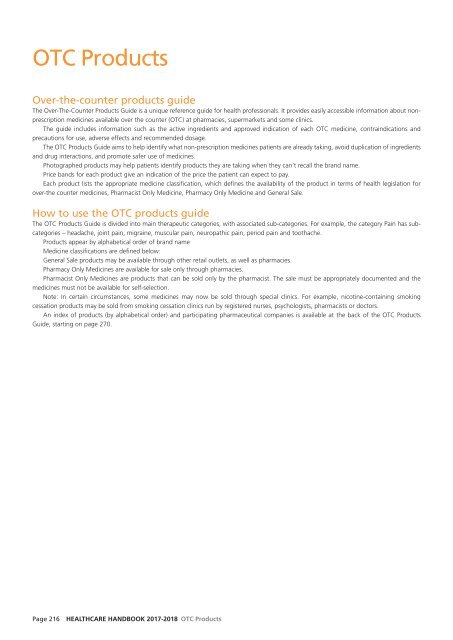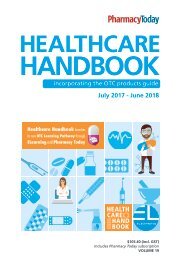- Page 1 and 2:
HEALTHCARE HANDBOOK incorporating t
- Page 3 and 4:
2017-2018 HEALTHCARE HANDBOOK PUBLI
- Page 5 and 6:
Index Common Disorders Acne--------
- Page 7 and 8:
Asthma and COPD CONTINUING OTC EDUC
- Page 9 and 10:
Head and scalp • Condition of hai
- Page 11 and 12:
HELP KIDS BE THEMSELVES AGAIN NEW L
- Page 14 and 15:
NUROFEN ZAVANCE* IS ABSORBED UP TO
- Page 16 and 17:
Acne Acne is a common skin problem
- Page 18 and 19:
Allergies An allergy occurs when th
- Page 20 and 21:
Asthma and COPD Asthma New Zealand
- Page 22 and 23:
Baby Feeding Breastfeeding is best
- Page 24 and 25:
Bites and Stings Bites and stings c
- Page 26 and 27:
Bruises, Scars, Spider Veins Bruise
- Page 28 and 29:
Childhood Diseases and Immunisation
- Page 30 and 31:
Childhood Diseases and Immunisation
- Page 32 and 33:
Childhood Diseases and Immunisation
- Page 34 and 35:
Childhood Diseases and Immunisation
- Page 36 and 37:
Childhood Pain and Baby Teething Pa
- Page 38 and 39:
Colds A cold is a contagious viral
- Page 40 and 41:
Cold Sores Cold sores are fluid-fil
- Page 42 and 43:
Constipation Constipation is the te
- Page 44 and 45:
Contraception & Sexual Wellbeing Co
- Page 46 and 47:
Contraception: Emergency Emergency
- Page 48 and 49:
Coughs: Dry Coughs are called dry o
- Page 50 and 51:
Coughs: Productive Coughs are consi
- Page 52 and 53:
Cuts, Abrasions and Blisters This t
- Page 54 and 55:
Cystitis [Bladder Infection] Cystit
- Page 56 and 57:
Dandruff Dandruff is a common condi
- Page 58 and 59:
Dermatitis/Eczema Dermatitis is a g
- Page 60 and 61:
Diabetes Diabetes is a condition in
- Page 62 and 63:
Diarrhoea and Vomiting Diarrhoea an
- Page 64 and 65:
Dry Skin Dry skin is skin that lack
- Page 66 and 67:
Ear Conditions Our ears allow us to
- Page 68 and 69:
Eye Conditions Almost two-thirds of
- Page 70 and 71:
Eye Conditions (continued) Type Sym
- Page 72 and 73:
Eyes: Contact Lenses Contact lenses
- Page 74 and 75:
Fever What is fever Fever is define
- Page 76 and 77:
Foot Care Common foot problems incl
- Page 78 and 79:
Fungal Infections: Superficial Supe
- Page 80 and 81:
Fungal Nail Infections (Onychomycos
- Page 82 and 83:
Gout Historically known as the “d
- Page 84 and 85:
Haemorrhoids Haemorrhoids (also cal
- Page 86 and 87:
Hair Loss Alopecia is the medical t
- Page 88 and 89:
Hay Fever Hay fever (also called in
- Page 90 and 91:
Hay Fever (continued) TREATMENT OPT
- Page 92 and 93:
Headache Headaches are common and c
- Page 94 and 95:
Head Lice Head lice (pediculosis ca
- Page 96 and 97:
Heart Health Cardiovascular (CV) di
- Page 98 and 99:
Indigestion, Heartburn and Gastriti
- Page 100 and 101:
Influenza Influenza (flu) is a comm
- Page 102 and 103:
Influenza (continued) TREATMENT OPT
- Page 104 and 105:
Iron Deficiency Iron is an essentia
- Page 106 and 107:
Irritable Bowel Syndrome Irritable
- Page 108 and 109:
Menopause Menopause - the “change
- Page 110 and 111:
Migraine Migraines are a type of se
- Page 112 and 113:
Muscular Aches, Pains and Tightness
- Page 114 and 115:
Nappy Rash Nappy rash is a red rash
- Page 116 and 117:
Oral Health Oral health disorders i
- Page 118 and 119:
Osteoarthritis Osteoarthritis is th
- Page 120 and 121:
Osteoporosis Osteoporosis (meaning
- Page 122 and 123:
Period Pain and Endometriosis Perio
- Page 124 and 125:
Poisonings Any substance that has t
- Page 126 and 127:
Pregnancy Tests and Supplements Hom
- Page 128 and 129:
Preventive Health There are certain
- Page 130 and 131:
Probiotics and Prebiotics Probiotic
- Page 132 and 133:
Psoriasis Psoriasis is a long-term
- Page 134 and 135:
Scabies Scabies is a very contagiou
- Page 136 and 137:
Shingles Shingles (herpes zoster) i
- Page 138 and 139:
Sinus and Nasal Problems Sinuses ar
- Page 140 and 141:
Sleep Problems and Snoring Sleep is
- Page 142 and 143:
Smoking Cessation Almost 5000 New Z
- Page 144 and 145:
Sore Throat Sore throats are very c
- Page 146 and 147:
Strains and Sprains Sprains and str
- Page 148 and 149:
Sun Care Sunburn Sunburn occurs fro
- Page 150 and 151:
Sun Care: Eye Protection Protecting
- Page 152 and 153:
Sweating: Excessive (Hyperhidrosis)
- Page 154 and 155:
Toothache Toothache is the term use
- Page 156 and 157:
Travel Health (including Vaccinatio
- Page 158 and 159:
Travel Sickness Travel, or motion,
- Page 160 and 161:
Urinary Incontinence Urinary incont
- Page 162 and 163:
Urticaria (Hives) Urticaria refers
- Page 164 and 165:
Vaginal Health The vagina is a clos
- Page 166 and 167:
Varicose Veins and Support Stocking
- Page 168 and 169:
Vitamins and Dietary Supplements Vi
- Page 170 and 171:
Warts Warts are benign (non-cancero
- Page 172 and 173:
Weight Loss Obesity has reached epi
- Page 174 and 175: Worms Pinworms (Enterobius vermicul
- Page 176 and 177: Wound Care Our skin acts as a barri
- Page 178 and 179: Wound Care (continued) Wound type M
- Page 180 and 181: Glossary WHAT DOES THAT WORD MEAN?
- Page 182 and 183: Chapter References (continued) Diar
- Page 184 and 185: Chapter References (continued) Gord
- Page 186 and 187: Significant learning opportunity: W
- Page 188 and 189: PharmacyToday A part of your everyd
- Page 190 and 191: OTC Medicines: Interactions When se
- Page 192 and 193: OTC Medicines: Interactions OTC Med
- Page 194 and 195: OTC Medicines: Interactions OTC Med
- Page 196 and 197: OTC Medicines: Interactions OTC Med
- Page 198 and 199: OTC Medicines: Precautions OTC Medi
- Page 200 and 201: OTC Medicines: Precautions OTC Medi
- Page 202 and 203: OTC Medicines: Adverse Effects OTC
- Page 204 and 205: Herbal Supplements: Interactions He
- Page 206 and 207: Herbal Supplements: Interactions He
- Page 208 and 209: Herbal Supplements: Interactions He
- Page 210 and 211: Herbal Supplements: Interactions He
- Page 212 and 213: Drugs in Sport Treating Athletes Me
- Page 214 and 215: Drugs in Aviation AVIATION - PRECAU
- Page 216 and 217: Drugs in Pregnancy Drug use in preg
- Page 218 and 219: NZ Support Groups ADHD Association
- Page 220 and 221: NZ Support Groups New Zealand AIDS
- Page 222 and 223: HEAT or INFLAMMATION Unlike heat ru
- Page 226 and 227: OTC Products Index Foot Care - Fung
- Page 228 and 229: »» Acne CRYSTADERM CREAM AFT PHAR
- Page 230 and 231: »» Childhood Pain and Baby Teethi
- Page 232 and 233: »» Colds BONNINGTON’S IRISH MOS
- Page 234 and 235: CODRAL RELIEF MAX STRENGTH COLD & F
- Page 236 and 237: OTRIVIN JUNIOR GLAXOSMITHKLINE CONS
- Page 238 and 239: DULCOLAX SANOFI CONSUMER HEALTHCARE
- Page 240 and 241: BENADRYL MUCUS RELIEF DOUBLE ACTION
- Page 242 and 243: »» Dandruff COCO-SCALP AFT PHARMA
- Page 244 and 245: EAR CLEAR WILSON CONSUMER PRODUCTS
- Page 246 and 247: »» Foot Care - Fungal Infections
- Page 248 and 249: TELFAST ORAL LIQUID SANOFI CONSUMER
- Page 250 and 251: NUROFEN ZAVANCE RECKITT BENCKISER (
- Page 252 and 253: MOOV HEAD LICE SOLUTION DOUGLAS PHA
- Page 254 and 255: GAVISCON DUAL ACTION LIQUID RECKITT
- Page 256 and 257: CODRAL COLD & FLU + COUGH JOHNSON &
- Page 258 and 259: »» Irritable Bowel Syndrome GASTR
- Page 260 and 261: VOLTAREN EMULGEL GLAXOSMITHKLINE CO
- Page 262 and 263: TURMERIC EXTRA STRENGTH GOOD HEALTH
- Page 264 and 265: PREGNOSIS EARLY PREGNANCY TEST DIP
- Page 266 and 267: »» Sexual Wellbeing - Contracepti
- Page 268 and 269: SUDAFED PE SINUS DAY + NIGHT RELIEF
- Page 270 and 271: NICORETTE INHALATOR JOHNSON & JOHNS
- Page 272 and 273: STREPSILS PLUS LOZENGES RECKITT BEN
- Page 274 and 275:
TRAVACALM TRAVEL BAND WILSON CONSUM
- Page 276 and 277:
CRYSTADERM CREAM AFT PHARMACEUTICAL
- Page 278 and 279:
An ENHANCED ELearning Experience As
- Page 280 and 281:
Product Index ANIME LUBRICANT 50ML-
- Page 282 and 283:
Manufacturer’s Index AFT Pharmace
- Page 284:
Topiramate Actavis Topiramate 25mg,



